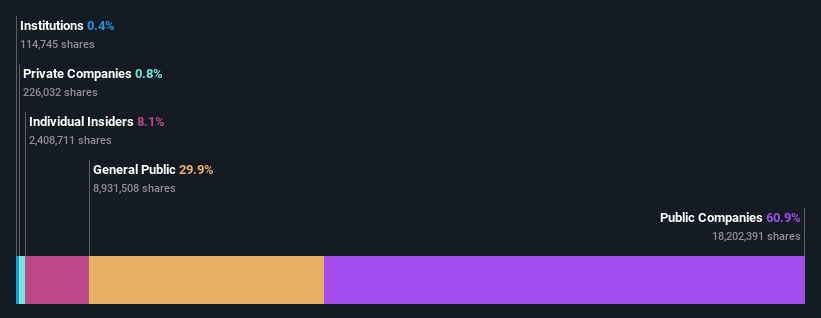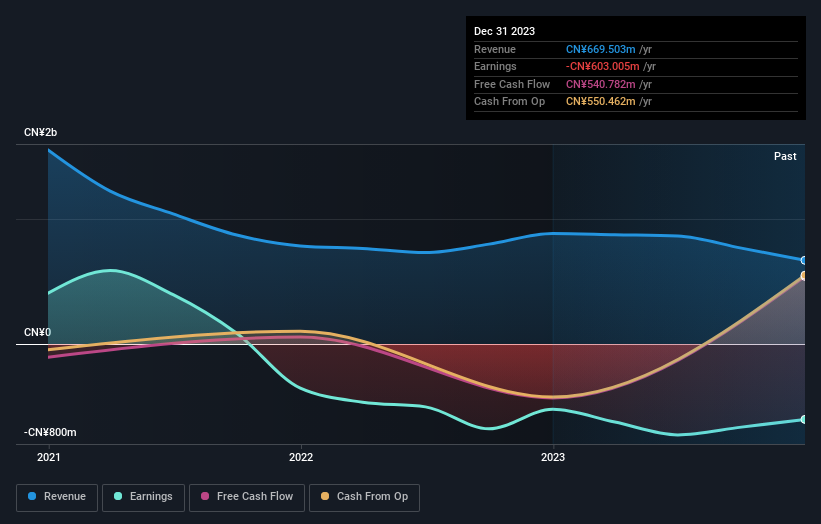Cheetah Mobile Inc. (NYSE:CMCM) stock most popular amongst public companies who own 61%, while individual investors hold 30%
Key Insights
The considerable ownership by public companies in Cheetah Mobile indicates that they collectively have a greater say in management and business strategy
61% of the business is held by the top 2 shareholders
Ownership research, combined with past performance data can help provide a good understanding of opportunities in a stock
To get a sense of who is truly in control of Cheetah Mobile Inc. (NYSE:CMCM), it is important to understand the ownership structure of the business. And the group that holds the biggest piece of the pie are public companies with 61% ownership. That is, the group stands to benefit the most if the stock rises (or lose the most if there is a downturn).
Individual investors, on the other hand, account for 30% of the company's stockholders.
Let's take a closer look to see what the different types of shareholders can tell us about Cheetah Mobile.
View our latest analysis for Cheetah Mobile
What Does The Lack Of Institutional Ownership Tell Us About Cheetah Mobile?
Small companies that are not very actively traded often lack institutional investors, but it's less common to see large companies without them.
There are multiple explanations for why institutions don't own a stock. The most common is that the company is too small relative to funds under management, so the institution does not bother to look closely at the company. On the other hand, it's always possible that professional investors are avoiding a company because they don't think it's the best place for their money. Institutional investors may not find the historic growth of the business impressive, or there might be other factors at play. You can see the past revenue performance of Cheetah Mobile, for yourself, below.
Cheetah Mobile is not owned by hedge funds. Kingsoft Corporation Limited is currently the company's largest shareholder with 45% of shares outstanding. With 16% and 8.1% of the shares outstanding respectively, Tencent Holdings Limited and Sheng Fu are the second and third largest shareholders. Sheng Fu, who is the third-largest shareholder, also happens to hold the title of Chairman of the Board.
To make our study more interesting, we found that the top 2 shareholders have a majority ownership in the company, meaning that they are powerful enough to influence the decisions of the company.
While it makes sense to study institutional ownership data for a company, it also makes sense to study analyst sentiments to know which way the wind is blowing. As far as we can tell there isn't analyst coverage of the company, so it is probably flying under the radar.
Insider Ownership Of Cheetah Mobile
While the precise definition of an insider can be subjective, almost everyone considers board members to be insiders. Management ultimately answers to the board. However, it is not uncommon for managers to be executive board members, especially if they are a founder or the CEO.
Most consider insider ownership a positive because it can indicate the board is well aligned with other shareholders. However, on some occasions too much power is concentrated within this group.
Our most recent data indicates that insiders own some shares in Cheetah Mobile Inc.. In their own names, insiders own US$14m worth of stock in the US$180m company. This shows at least some alignment, but we usually like to see larger insider holdings. You can click here to see if those insiders have been buying or selling.
General Public Ownership
The general public-- including retail investors -- own 30% stake in the company, and hence can't easily be ignored. This size of ownership, while considerable, may not be enough to change company policy if the decision is not in sync with other large shareholders.
Public Company Ownership
Public companies currently own 61% of Cheetah Mobile stock. This may be a strategic interest and the two companies may have related business interests. It could be that they have de-merged. This holding is probably worth investigating further.
Next Steps:
It's always worth thinking about the different groups who own shares in a company. But to understand Cheetah Mobile better, we need to consider many other factors. Case in point: We've spotted 3 warning signs for Cheetah Mobile you should be aware of, and 1 of them is a bit unpleasant.
Of course this may not be the best stock to buy. So take a peek at this free free list of interesting companies.
NB: Figures in this article are calculated using data from the last twelve months, which refer to the 12-month period ending on the last date of the month the financial statement is dated. This may not be consistent with full year annual report figures.
Have feedback on this article? Concerned about the content? Get in touch with us directly. Alternatively, email editorial-team (at) simplywallst.com.
This article by Simply Wall St is general in nature. We provide commentary based on historical data and analyst forecasts only using an unbiased methodology and our articles are not intended to be financial advice. It does not constitute a recommendation to buy or sell any stock, and does not take account of your objectives, or your financial situation. We aim to bring you long-term focused analysis driven by fundamental data. Note that our analysis may not factor in the latest price-sensitive company announcements or qualitative material. Simply Wall St has no position in any stocks mentioned.

 Yahoo Finance
Yahoo Finance 

